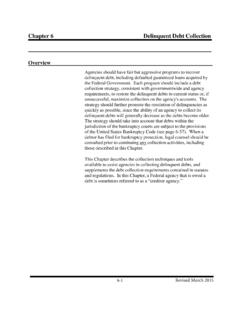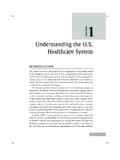Transcription of Chapter Seven Health Systems - WHO
1 Health Systems : principled integrated care103 Chapter SevenHealth Systems :principled integrated careTo meet the formidable challenges described earlier, this chap-ter calls for the reinforcement of Health Systems to be basedon the core principles of primary Health care as outlined atAlma-Ata in 1978: universal access and coverage on the ba-sis of need; Health equity as part of development oriented tosocial justice; community participation in defining and imple-menting Health agendas; and intersectoral approaches tohealth. These principles remain valid, but must be reinterpretedin light of the dramatic changes in the Health field during thepast 25 years.
2 Four important issues that Health Systems mustconfront are examined: the global Health workforce crisis, in-adequate Health information, lack of financial resources, andthe stewardship challenge of implementing pro- equity healthpolicies in a pluralistic World Health Report 2003 Health Systems : principled integrated care1057 Health Systems :principled integrated careConfronting the global Health challenges examined in the previous chapters requires healthsystems to be strengthened. Without this, the Health goals described in this report will remainbeyond reach. The lessons learnt from past successes, including the skills and strategiesdeveloped from the experiences of tackling polio and SARS, must be applied in combatingthe HIV/AIDS treatment emergency and in working towards the Millennium DevelopmentGoals (MDGs).
3 Progress towards these and other objectives will not be sustainable unlessspecific Health targets including the 3 by 5 target of reaching three million people indeveloping countries with combination antiretroviral therapy for HIV/AIDS by the end of2005 support a broad horizontal build-up of the capacities of Health the Health reforms of recent decades, inadequate progress has been made in buildinghealth Systems that promote collective Health improvement. Now, however, fresh opportuni-ties are emerging. Health stands high on the international development agenda, and newfunds are becoming available for Health work in poor countries.
4 Extending Health -enablingconditions and quality care to all is the major imperative for Health Chapter explores how the values and practices of primary Health care, adapted to therealities of today s complex Health landscape, might provide a basis for the improvement ofhealth Systems . It reviews basic ideas about primary Health care and clarifies the concept ofthe development of Health Systems that are based on primary Health care. It then examinesfour major challenges facing Health Systems : the global Health workforce crisis; the lack ofappropriate, timely evidence; the lack of financial resources; and the stewardship challenge ofimplementing pro- equity Health policies in a pluralistic environment.
5 The final section looksat how WHO is working with countries to clarify Health Systems goals and to strengthensystems in line with primary Health care Health system comprises all organizations, institutions and resources that produce ac-tions whose primary purpose is to improve Health (1). The Health care system refers to theinstitutions, people and resources involved in delivering Health care to individuals. This chapteris mostly concerned with Health care Systems . Nevertheless, Health care providers are ofteninvolved in promoting Health -enabling conditions in the community. Indeed, this relation-ship between patient care and public Health functions is one of the defining characteristics ofthe primary Health care Health Systems performance assessment framework developed by WHO in the late 1990swas an attempt to put into effect the primary Health care concern for equity and populationhealth outcomes, by providing analytical tools to translate these concerns into relevant106 The World Health Report 2003evidence.
6 The framework drew the attention of policy-makers to issues such as the cata-strophic Health expenditure in a number of countries. Although this report does not directlyapply the framework, it assumes that policy-makers will use this and other relevant tools tomeasure the success of an approach to Health Systems scale-up based on primary Health knowledge has been gained in recent years about how Health Systems work and whythey fail. Initiatives such as the European Observatory on Health Care Systems are producingimportant insights (see Box ), though fundamental questions remain unresolved.
7 Thisreport does not propose a complete model of the development of Health Systems based onprimary Health care, which would be impossible given the current state of evidence. The aimis to open lines of enquiry that will be of use to countries and international Health partners asthey weigh options and take action to strengthen Systems , making them responsive to theneeds and demands of all, especially the core principles of primary Health carePrimary Health care became a core policy for WHO in 1978, with the adoption of the Decla-ration of Alma-Ata and the strategy of Health for all by the year 2000.
8 Twenty-five yearslater, international support for the values of primary Health care remains strong. Preliminaryresults of a major review suggest that many in the global Health community consider a pri-mary Health care orientation to be crucial for equitable progress in Health (2).No uniform, universally applicable definition of primary Health care exists. Ambiguities werepresent in the Alma-Ata document, in which the concept was discussed as both a level of careand an overall approach to Health policy and service provision. In high-income and middle-income countries, primary Health care is mainly understood to be the first level of care.
9 Inlow-income countries where significant challenges in access to Health care persist, it is seenmore as a system-wide The European Observatory on Health Care SystemsCountries in the European Region diverse in terms of language, his-tory and wealth have an array of approaches to the organization ofhealth Systems . The European Observatory on Health Care Systems andpolicies seeks to disseminate information on more than a decade ofchange, analysing the reforms and generating evidence on what worksin different contexts and why. It ensures that Europe s national policy-makers can set their own experiences in the European context and makecomparisons across borders, draw on thematic and comparative analy-sis of the key challenges they face, and have access to clear, Observatory is a partnership that brings together the WHOR egional Office for Europe, governments (Greece, Norway and Spain),international and nongovernmental agencies (the European InvestmentBank, the Open Society Institute, and the World Bank)
10 And academia(the London School of Economics and Political Science and the LondonSchool of Hygiene and Tropical Medicine). All the Observatory s materi-als are available on its web and monitoring. The Health System in Transitionseries of 70 country profiles provides analytical answers to a standardset of questions and uses clear definitions to create a baseline of infor-mation, drawing attention to what is distinct about a particular Observatory covers the whole European Region and some addi-tional OECD countries, to allow systematic comparisons and the reviewof reforms over The Observatory produces comprehensive studies on keyhealth system and policy areas, including hospitals, funding, regulation,European enlargement, social Health insurance, purchasing, primary care.


















